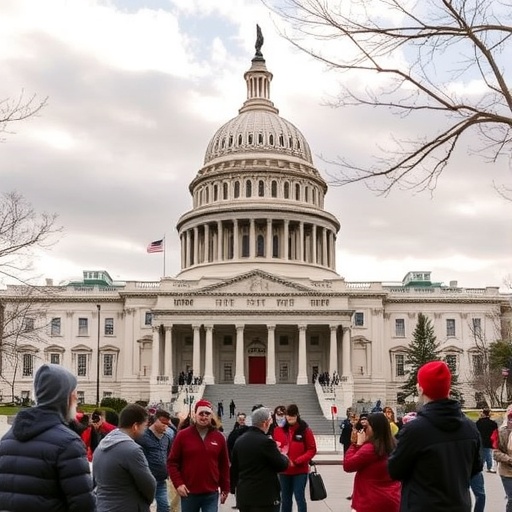House of Representatives Cancels Votes as Government Shutdown Deepens, SNAP Benefits Face November 1 Cutoff
In a stunning escalation of the ongoing budget impasse, the House of Representatives has abruptly canceled all scheduled votes for next week, virtually guaranteeing that the government shutdown will drag on into the foreseeable future. As lawmakers pack their bags and head home for the weekend, the ripple effects are already being felt across the nation, with several states issuing stark warnings about suspending critical SNAP benefits as early as November 1. This move by Congress underscores the deepening crisis over federal funding, leaving millions of Americans in limbo and federal operations grinding to a halt.
- Lawmakers Flee Washington as Shutdown Stalemate Persists
- States Sound Alarm: SNAP Benefits Suspension Looms by November 1
- Federal Agencies Reel from Funding Freeze and Worker Furloughs
- Bipartisan Backlash Grows as Public Pressure Mounts on Congress
- Path Forward: Debt Ceiling Deadline Adds Urgency to Shutdown Resolution
The decision, announced late Friday afternoon, comes just days after the partial shutdown began on October 1, triggered by disagreements over spending bills and debt ceiling hikes. With no resolution in sight, the House leadership cited the lack of bipartisan agreement as the primary reason for pulling the plug on legislative activity. “We’re at an impasse,” said House Speaker Mike Johnson in a brief statement. “Pushing forward with votes under these circumstances would only exacerbate divisions rather than resolve them.” This isn’t just a procedural hiccup; it’s a signal that the shutdown could extend well beyond the initial projections, potentially costing the economy billions and disrupting essential services.
Lawmakers Flee Washington as Shutdown Stalemate Persists
As the Capitol corridors emptied faster than usual this Friday, the atmosphere in Washington was thick with frustration and uncertainty. The House of Representatives, typically buzzing with activity even during tense periods, fell eerily quiet as members of Congress from both parties boarded flights home, leaving behind a mountain of unresolved issues. The cancellation of next week’s votes—originally slated to include key appropriations measures—was a direct response to the failure of negotiations on a continuing resolution to avert the government shutdown.
Behind the scenes, sources close to the leadership revealed that intense closed-door sessions yielded no breakthroughs. Democrats accused Republicans of holding federal operations hostage over unrelated policy riders, such as border security enhancements and energy provisions. “This is brinkmanship at its worst,” remarked Senate Minority Leader Chuck Schumer during a press gaggle outside the Capitol. “Families are suffering while politicians play games.” On the Republican side, hardliners praised the pause, arguing it forces Democrats to the table on fiscal responsibility. Rep. Marjorie Taylor Greene, R-Ga., tweeted, “No more blank checks. Time for real cuts before we fund the swamp.”
The human element of this exodus can’t be overstated. Staffers in the House of Representatives offices are now facing furloughs, with non-essential personnel sent home without pay. According to the Congressional Budget Office, previous shutdowns have cost federal workers upwards of $2 billion in lost wages collectively. This time, with the calendar pushing into November, the financial strain on these families could be even more acute, especially as holiday seasons approach.
Historically, shutdowns have been resolved within weeks, but the current dynamics—exacerbated by a slim Republican majority in the House of Representatives and election-year posturing—suggest a longer ordeal. The last major shutdown in 2018-2019 lasted 35 days, the longest in U.S. history, and inflicted widespread damage. Analysts warn that without swift action from Congress, this one could rival or surpass that record.
States Sound Alarm: SNAP Benefits Suspension Looms by November 1
While Washington dithers, the real-world consequences are hitting closest to home for low-income families reliant on SNAP benefits, the Supplemental Nutrition Assistance Program formerly known as food stamps. At least five states—California, New York, Texas, Florida, and Illinois—have issued formal alerts to residents, warning that without restored federal funding, they may be forced to suspend SNAP benefits payouts starting November 1. This deadline aligns with the exhaustion of state-level emergency reserves, which were bolstered during the COVID-19 pandemic but are now dwindling amid the government shutdown.
In California, the nation’s most populous state, officials estimate that over 5 million recipients could lose access to monthly benefits averaging $200 per household. “We’re doing everything we can to stretch our resources, but federal dollars are the lifeline,” said Department of Social Services spokesperson Maria Gonzalez. A recent USDA report highlighted that SNAP benefits serve 41 million Americans annually, reducing food insecurity by 30% in participating households. The potential cutoff has sparked panic among advocacy groups; the Food Research & Action Center called it “a humanitarian crisis in the making,” urging Congress to prioritize funding.
Texas, facing its own budget constraints, has already begun outreach campaigns to inform SNAP enrollees of contingency plans, including partnerships with local food banks. Gov. Greg Abbott’s office stated, “The government shutdown is a federal failure, but Texas will not let our most vulnerable fall through the cracks—though our hands are tied without federal funding.” Similar sentiments echoed from Florida, where hurricane recovery efforts are compounding the strain. State data shows that SNAP benefits distribution costs states about 50% of administrative expenses, with the rest covered by Washington—a formula now unraveling.
Economically, the stakes are high. The SNAP benefits program injects $120 billion into local economies each year, supporting grocery stores, farmers, and jobs. A suspension could lead to a 1-2% dip in retail sales in affected regions, per estimates from the Center on Budget and Policy Priorities. For families, the impact is immediate and visceral: parents skipping meals to feed children, increased reliance on underfunded charities, and a spike in hunger-related health issues.
Federal Agencies Reel from Funding Freeze and Worker Furloughs
Beyond SNAP benefits, the government shutdown is paralyzing a host of federal funding-dependent agencies, from national parks to research labs. The National Park Service, for instance, has closed iconic sites like Yosemite and the Grand Canyon to visitors, turning away thousands over the weekend. Rangers, deemed essential, are working without pay, while maintenance crews are sidelined, risking long-term damage to these treasures.
In the realm of public health, the Centers for Disease Control and Prevention (CDC) is operating at reduced capacity, delaying flu vaccine distribution and disease surveillance programs. “This shutdown couldn’t come at a worse time, with respiratory illnesses on the rise,” noted Dr. Anthony Fauci in a recent interview. Federal funding cuts are also hitting education, with the Department of Education halting new grant approvals for schools, affecting Title I programs that support 25 million low-income students.
The IRS, already understaffed, has paused some taxpayer services, potentially delaying refunds for millions. According to a Government Accountability Office (GAO) analysis, shutdowns cost the government $1.5 billion per week in lost productivity alone. This time, with Congress adjourning, the tab could climb higher. Federal employees, numbering over 2 million civilians, are bracing for the worst; many are dipping into savings or relying on credit, as seen in past impasses.
Military families aren’t spared either. While active-duty troops receive paychecks, civilian defense workers—about 800,000 strong—are furloughed. The Department of Defense has contingency funds for two weeks, but after that, disruptions to bases and procurement could ensue. “Our service members deserve better than this partisan chaos,” said Sen. Jack Reed, D-R.I., ranking member of the Armed Services Committee.
Bipartisan Backlash Grows as Public Pressure Mounts on Congress
The House of Representatives‘ decision to cancel votes has ignited a firestorm of criticism from across the political spectrum, with polls showing public approval for Congress plummeting to historic lows. A new Quinnipiac University survey found that 62% of Americans blame lawmakers equally for the government shutdown, up from 55% last week. Business leaders, from the U.S. Chamber of Commerce to small business associations, are sounding the alarm on economic fallout.
“Uncertainty is the enemy of investment,” warned Chamber President Suzanne Clark in a statement. Wall Street echoed these concerns, with the Dow Jones dipping 1.2% on Friday amid shutdown fears. Small businesses, particularly those dependent on government contracts, report delayed payments totaling $10 billion already. In Silicon Valley, tech firms reliant on federal R&D grants are halting projects, stifling innovation.
Grassroots movements are mobilizing too. Organizations like No Labels have launched ad campaigns targeting swing-district representatives, demanding a clean funding bill. Veteran groups, hit hard by VA service interruptions, rallied outside the Capitol, chanting “Pay our promises.” Even some conservative voices are turning. Rep. Brian Fitzpatrick, R-Pa., a moderate, co-authored a letter with Democrats calling for immediate talks: “The government shutdown hurts everyone—let’s end this now.”
Internationally, the impasse is eroding U.S. credibility. Diplomats report strained alliances, with foreign aid programs frozen, affecting global food security initiatives tied to SNAP benefits-like programs abroad. The White House, through Press Secretary Karine Jean-Pierre, accused Congress of “sabotaging the economy for political points,” while President Biden prepares to address the nation next week.
Path Forward: Debt Ceiling Deadline Adds Urgency to Shutdown Resolution
As lawmakers enjoy a brief respite over the weekend, the clock is ticking louder than ever. The government shutdown coincides with an approaching debt ceiling deadline on November 15, when Treasury Secretary Janet Yellen warns the U.S. could default on obligations without action from Congress. This dual crisis amplifies the pressure, with economists predicting a 0.5% GDP hit if unresolved.
Potential next steps include emergency sessions post-weekend, though optimism is low. Bipartisan working groups are quietly forming, focusing on a short-term funding bill to buy time. Experts like Maya MacGuineas of the Committee for a Responsible Federal Budget suggest coupling shutdown resolution with modest reforms: “Tie it to spending caps to satisfy conservatives, while protecting essentials like SNAP benefits.”
For states, interim measures like borrowing against future federal funding are under consideration, but legal hurdles abound. Advocacy for vulnerable populations is ramping up, with calls for presidential executive actions to safeguard SNAP benefits—though legal experts doubt their scope. As November 1 nears, food pantries are stockpiling supplies, but experts warn it’s no substitute for systemic support.
Looking ahead, this shutdown could reshape midterm narratives, with vulnerable incumbents in the House of Representatives facing voter wrath. Resolutions, when they come, may involve compromises on immigration and climate funding, but the damage—in trust, economy, and daily lives—will linger. Americans, from furloughed workers to hungry families, await not just relief, but accountability from the leaders they elected.








